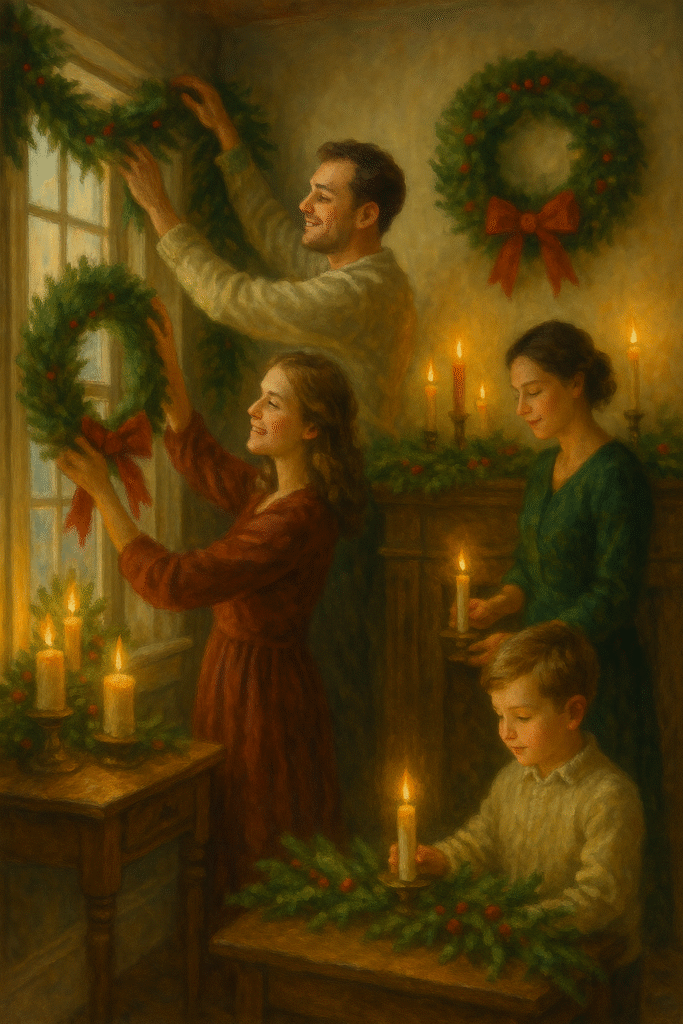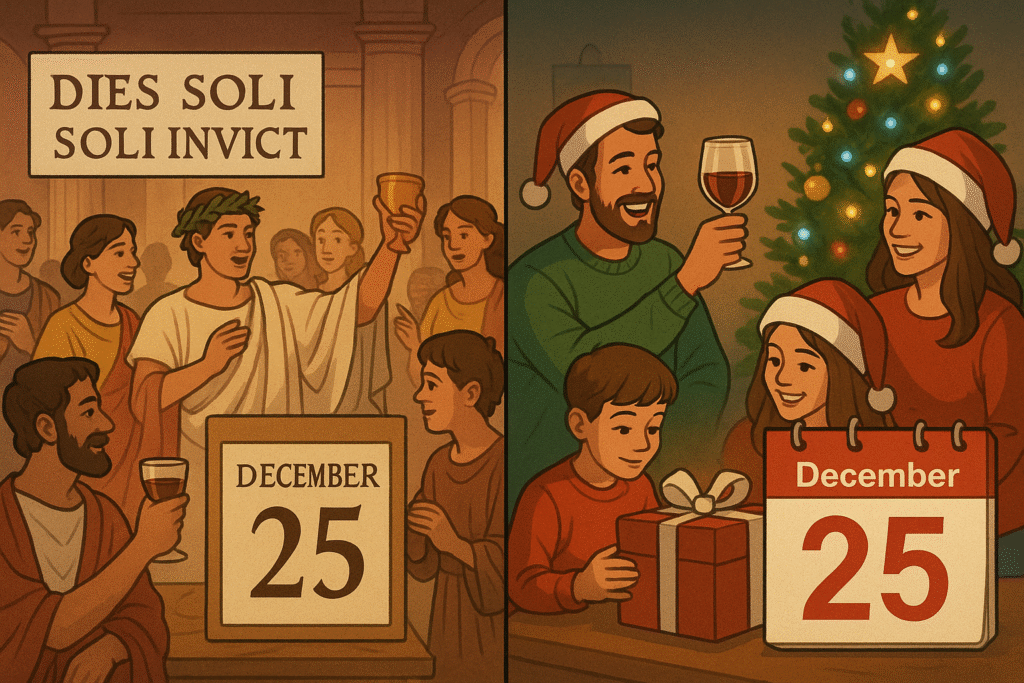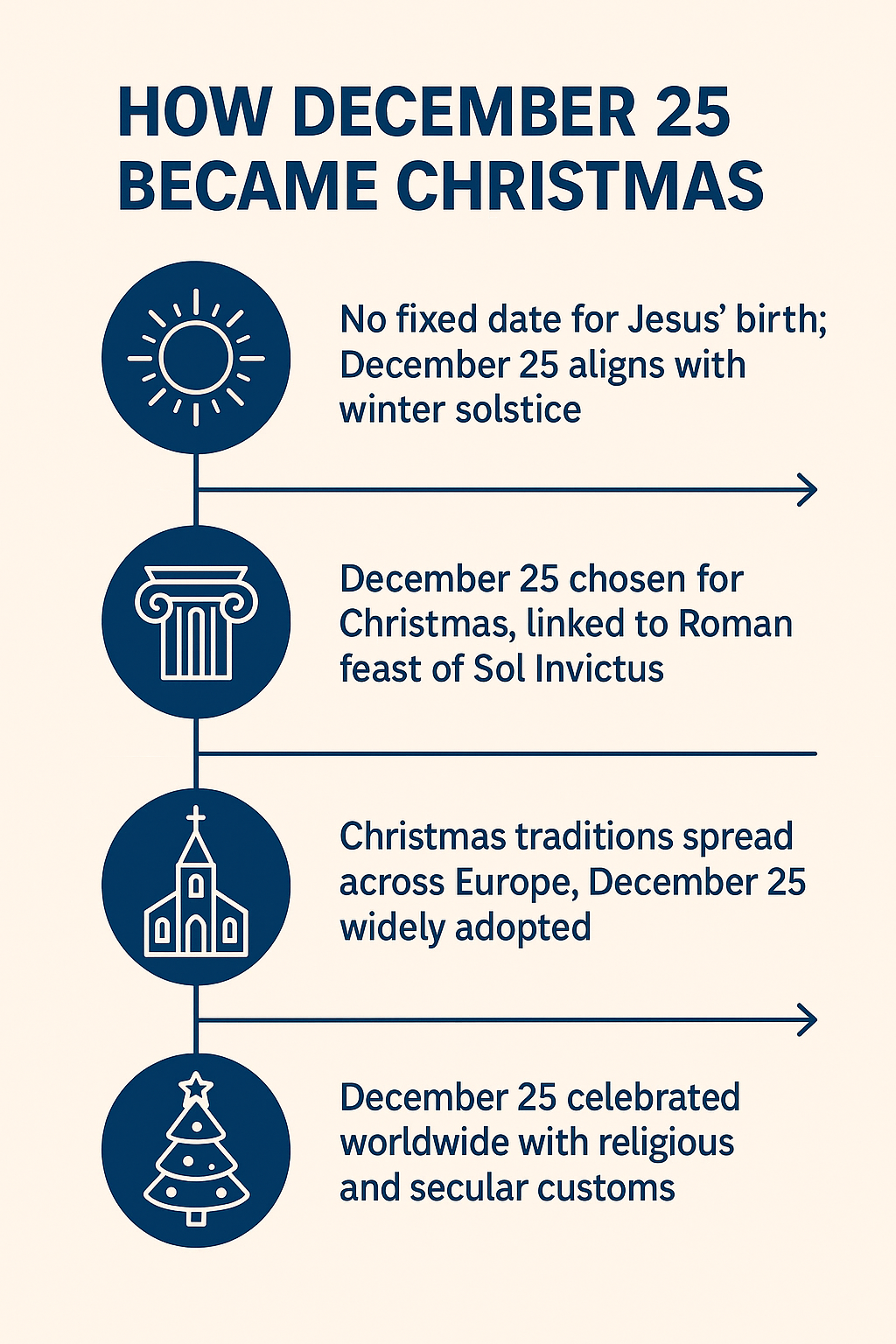Christmas falls on December 25th each year, but why this date? The answer combines faith, history, and ancient traditions—making the season even more meaningful.
Christmas is one of the most widely celebrated holidays in the world, but have you ever wondered why December 25th was chosen as the date for celebrating the birth of Jesus Christ? The choice of this date is not as straightforward as many assume. It’s a fascinating story that blends history, faith, and cultural traditions.
The Bible Doesn’t Mention a Date
The New Testament recounts the story of Jesus’ birth in Bethlehem, but it does not provide a specific date. Early Christians focused more on Jesus’ ministry and resurrection than on His birth. For the first few centuries, the actual date wasn’t emphasized, and different communities celebrated it at various times—some in spring, others in January.
The Roman Connection 🌞
The official celebration of Christmas on December 25th began in the 4th century under the Roman Empire. Historians believe the date was chosen to align with existing festivals:
- Saturnalia: A weeklong festival in honor of Saturn, marked by feasting, gift-giving, and merrymaking.
Sol Invictus: The Roman Festival on December 25th
- Festival Name: Dies Natalis Solis Invicti — meaning “Birthday of the Unconquered Sun”
- Date: December 25th
- Introduced: 274 AD by Emperor Aurelian, who made Sol Invictus the official sun god of Rome.
- Meaning: It marked the winter solstice (when the days begin to lengthen) and symbolized the rebirth of light after the darkest time of year.
Romans celebrated with games, feasts, and offerings to honor the sun god. It was a popular festival across the empire because it carried hope—longer, brighter days were returning.
- Sol Invictus (“The Unconquered Sun”): Celebrated on December 25th, this festival honored the sun god during the winter solstice—the “rebirth” of light as days began to grow longer.
By placing Christmas on December 25th, the Church could both honor Jesus as the “Light of the World” and offer Christians a holy alternative to pagan festivals.
🌿 What Was Saturnalia?
Saturnalia was an ancient Roman festival in honor of Saturn, the god of agriculture and time. It was originally held on December 17th, but later expanded to December 17–23. It was one of the most popular festivals in Rome, celebrated with feasting, role reversals, gift-giving, and merrymaking.
🏛️ Origins and Meaning
- God Saturn: In Roman mythology, Saturn was linked to sowing seeds and agricultural abundance.
- Golden Age Memory: Romans associated Saturn with a mythical “Golden Age,” a time of equality, peace, and plenty. Saturnalia symbolized a return to that ideal world for a few days each year.
- Temple Rituals: The festival began with a sacrifice at the Temple of Saturn in the Roman Forum. The statue of Saturn was unbound from its usual restraints (symbolizing freedom), and public banquets followed.
🎉 Customs and Traditions
- Social Role Reversal
- Masters served meals to their slaves.
- Slaves were allowed to speak freely, gamble, and mock their owners without punishment.
- A sense of temporary equality was central to the celebration.
- Gift-Giving
- People exchanged sigillaria (small clay or wax figurines), candles, and other symbolic presents.
- This practice is one reason Saturnalia is often linked to later Christmas traditions.
- Banquets & Feasting
- Families and communities shared large public feasts.
- Excess, indulgence, and joy were the rule of the day.
- Lord of Misrule / King of Saturnalia
- A mock “king” (often chosen by lot) presided over the festivities, commanding humorous or absurd tasks.
- This influenced medieval “Feast of Fools” celebrations and even modern carnival traditions.
- Gambling and Relaxation
- Normally frowned upon, dice games were allowed during Saturnalia.
- Schools and courts closed—Rome essentially went on holiday.
🌟 Connection to Christmas
- Timing: Saturnalia occurred in late December, close to the winter solstice (Dec 21/22).
- Joyful Themes: Gift-giving, feasting, lights, and greenery became echoed in early Christmas traditions.
- Cultural Influence: When Christianity spread in Rome, many Saturnalia customs were absorbed or reshaped into Christmas and New Year festivities.
📜 Legacy
Even after Rome’s fall, Saturnalia’s spirit lingered:
- Medieval Europe had winter feasts with role reversals, mock kings, and festivities.
- Some scholars say Saturnalia is the direct ancestor of many Christmas traditions we still keep today. Such as
Gift-Giving → Romans exchanged presents such as candles, figurines, and sweets during Saturnalia, similar to our Christmas gift exchanges.
Feasting & Merrymaking → Saturnalia was famous for its lavish banquets, parties, and social gatherings—echoed today in Christmas feasts and holiday celebrations.
Decorations → Homes were adorned with greenery, wreaths, and garlands during Saturnalia, just as we decorate with evergreens, holly, and wreaths at Christmas.

Role Reversal & Equality → Masters and slaves dined together, and normal social rules were relaxed. This spirit of goodwill and equality is reflected in the Christmas ideal of peace, charity, and kindness.
Candles & Lights → Lighting candles during Saturnalia symbolized the return of the sun after the winter solstice; this carried over into Christmas candles and later into festive lights.
Seasonal Timing → Saturnalia was held near the winter solstice, and early Christians set Christmas on.
December 25 partly to align with existing festivals (Saturnalia and Sol Invictus).
Festive Atmosphere → Singing, playing games, wearing colorful clothing, and exchanging “good wishes” were all Saturnalia customs, echoed in modern caroling, Christmas parties, and holiday greetings.

Symbolism of Light in Winter 🌟
For ancient people, the winter solstice was a turning point—longer days meant hope and renewal. For Christians, Jesus’ birth was seen as the spiritual light entering the world, making December 25th a powerful symbol of new beginnings.
A Theological Calculation
Another reason points to theology: early Christians marked March 25th as the day of Jesus’ conception (the Feast of the Annunciation). Nine months later falls on December 25th—tying His birth to creation and renewal.
When Christianity became more established in the 4th century, Church leaders placed the celebration of Jesus’ birth on the same date. The symbolism was powerful:
- Romans celebrated the rebirth of the sun 🌞
- Christians celebrated the birth of the Son ✝️
This clever alignment helped Christianity blend with existing Roman traditions, making December 25th a natural fit for what became Christmas Day.
✅ Quick Fact for Your Readers:
The Roman festival of Sol Invictus on December 25th was about the rebirth of sunlight. Early Christians used the same date to honor Jesus as the true “Light of the World.”

Do All Christians Celebrate on December 25th?
Not exactly. Some Eastern Orthodox churches follow the older Julian calendar, celebrating Christmas on January 7th. Despite the different dates, the heart of the holiday—the joy of Christ’s birth—remains the same.
Christmas Is More Than a Date 🎁
Whether chosen for its symbolism, history, or theology, December 25th became the day when Christians around the world pause to celebrate love, hope, and light in the midst of winter. Today, it’s not just about history—it’s about togetherness, traditions, and joy.
✅
Christmas is celebrated on December 25th, not because it marks the exact birthday of Jesus, but because the early Church chose a date rich in symbolism—aligning with festivals of light and emphasizing Christ as the true Light of the World.
✨ Bonus FAQ (SEO + Featured Snippet Friendly):
- Was Jesus really born on December 25th?
Most likely not. The Bible does not give a specific date. December 25th was chosen later for symbolic and cultural reasons. - Why do some celebrate Christmas on January 7th?
Eastern Orthodox churches follow the Julian calendar, which places Christmas 13 days later than the Western (Gregorian) calendar. - Did Christmas replace pagan festivals?
In part, yes. Early Christians aligned Christmas with Roman celebrations like Saturnalia and Sol Invictus, giving the holiday a Christian meaning.














